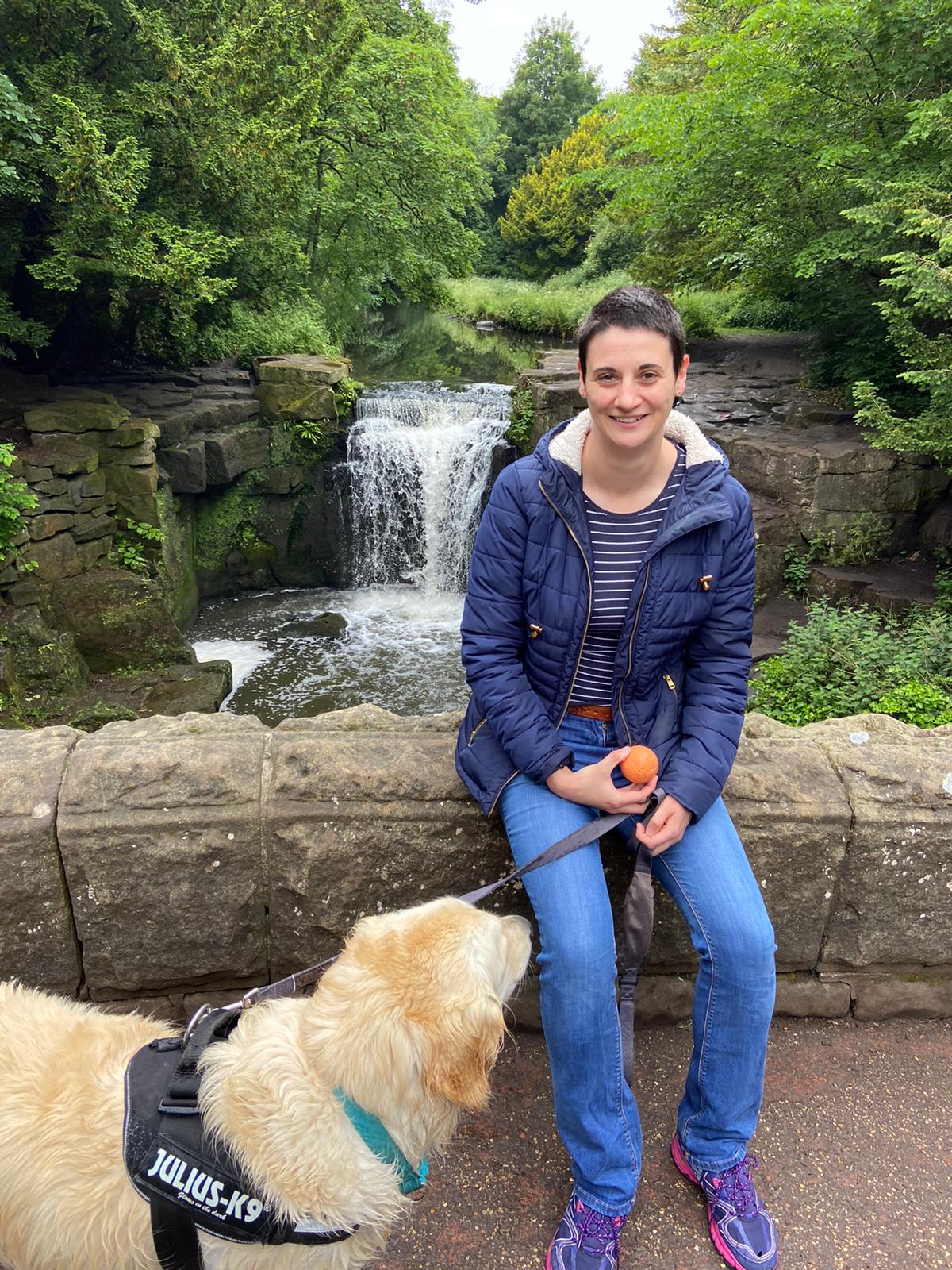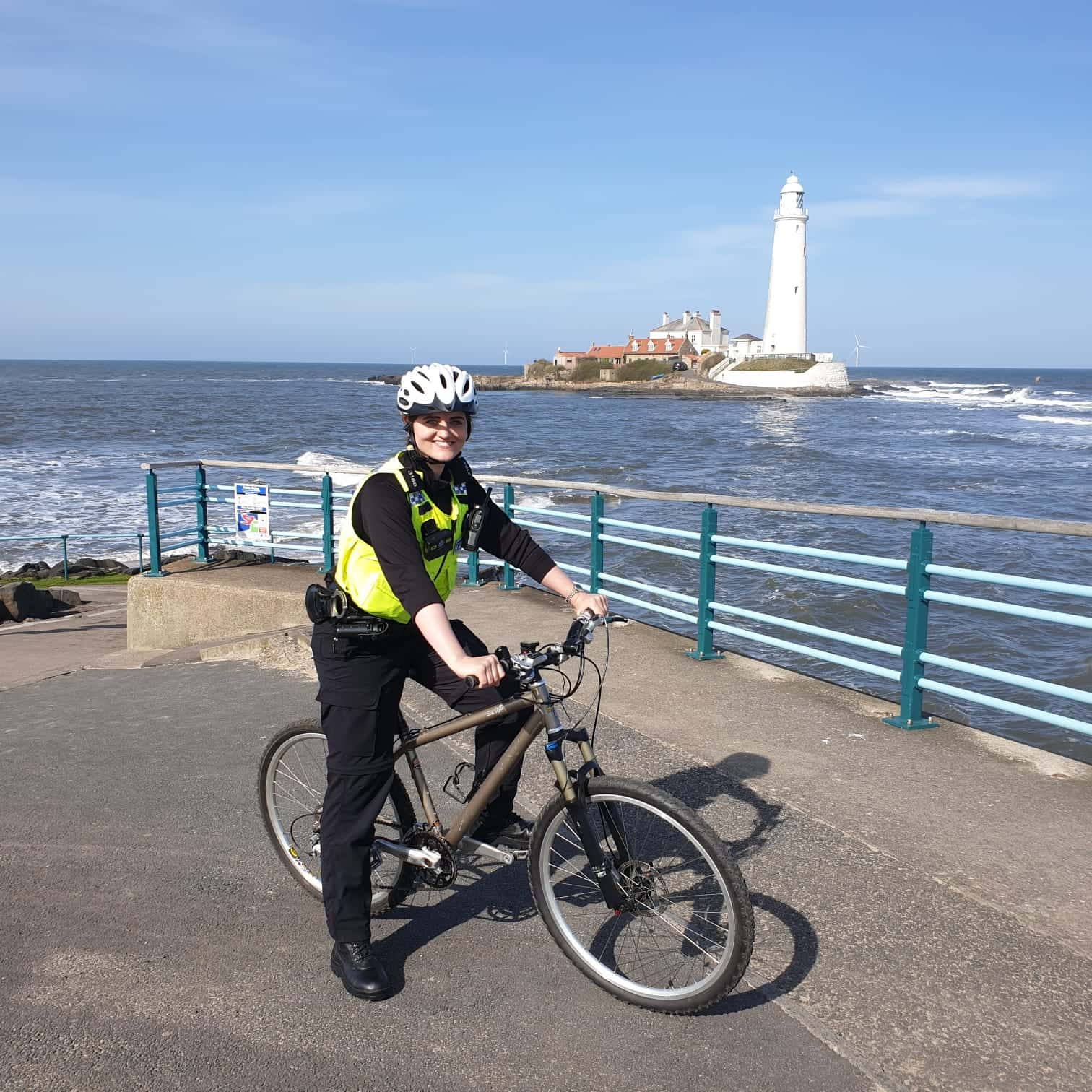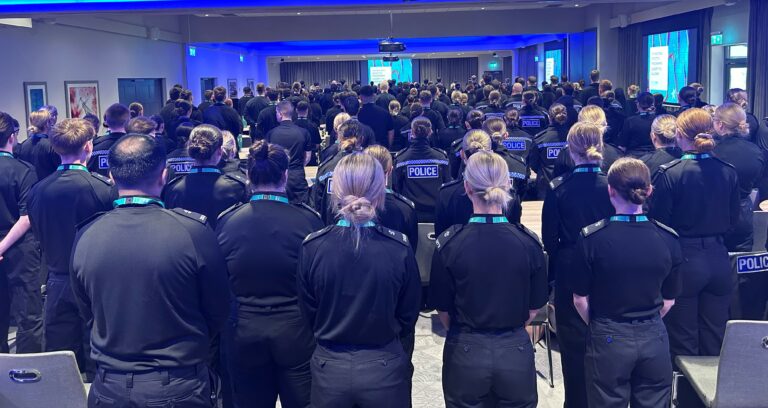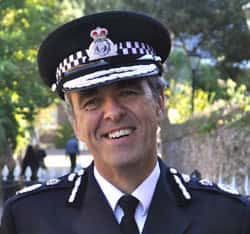Police Now officers tackling crime alongside colleagues at Northumbria Police
Friday 18 June 2021
70 police constables and 16 detective constables have joined the force via Police Now
Police Now attracts and develops the most diverse group of officers in policing
Officers’ actions lead to crime reductions
Officers on Police Now’s National Graduate Leadership Programme have been working alongside their colleagues within their local neighbourhood teams and are contributing to tackling crime in Northumbria.
PC Amii Stewart of Northumbria Police led the response to a spate of thefts from vehicles in an area of North Shields – she disseminated leaflets in high-risk areas and conducted house-to-house visits to keep residents informed and provide reassurance. As a result, the number of reported thefts from vehicles in this area fell.
PC Maggie Ashton, also of Northumbria Police and formally a Troop Commander in the Royal Signals, recently helped tackle an issue of repeat crime in an area of Blyth as one of those leading on Project Aurora. This saw officers and partner agencies come together to build on work already under way, focussing on problem offenders, environmental health issues, community engagement and poor-quality private housing. In one week, 23 tonnes of waste were removed, graffiti was cleared from lanes, drugs were seized and four connected arrests made. A virtual residents meeting was held which received a positive response. There was a fall of nearly half (44%) in anti-social behaviour perpetrated by young people and an overall reduction in crime in targeted problem areas.
Police Now’s mission is to transform communities by recruiting, developing and inspiring diverse leaders in policing.
Officers on Police Now’s programmes develop skills in leadership and problem-solving. They share a commitment to public service, fighting crime and inspiring social change alongside their colleagues.
Speaking of her role as a neighbourhood officer, PC Ashton, said: “What I’ve learnt from my neighbourhood role is that building relationships with people is the main way to tackle crime and ASB – that means building relationships with offenders to understand why they offend and with members of the community to understand their issues.”
When asked about her motivations for leaving her role in the army and as a teacher to join policing, she said: “I wanted to pursue a career which involved helping people and I knew that policing would provide an exciting, varied career where I could really make a difference.”
Reflecting on the career change, she said: “If you want a career that challenges you every day and provides real opportunities to make a difference, policing ticks all the boxes.”
Police Now has recruited a total of 1,830 officers across 33 forces in the UK, including Northumbria Police who have partnered with Police Now for the past three years with 70 police constables and 16 detective constables joining the force via this route.
Police Now consistently recruits more officers who are women or from black, Asian and minority ethnic backgrounds compared to any other entry route into policing. In Northumbria Police, over half (59%) of Police Now recruits identify as female.
PC Stewart said: “It is important we reflect the communities we serve for many reasons, including to help ensure we are the best we can possibly be and so that people can relate to our officers. Through continued engagement, we can build confidence and help address the issues which really matter to people.”
“The North East is such a fantastic place to live and work – and I am proud to serve all of the communities who contribute so much to the region.”
“We’re incredibly proud of the positive impact our participants continue to have within their local communities, and their commitment to driving positive change with their colleagues so that everyone in our society, including the most vulnerable, have a chance to thrive”.
David Spencer
Co-founder of Police Now and former Detective Chief Inspector
Impact in the
community
Q&A with Police Constable Maggie Ashton
Neighbourhood Police Officer
Northumbria Police
National Graduate Leadership Programme Alumna

Police Now is trying to increase diversity in the force. Do you think having a force that better reflects the community it serves helps to bring down crimes like anti-social behaviour and why?
Yes, because ultimately we can only police in this country with the consent of the public and if the police are seen as “different” from the people then we’ll have no respect or legitimacy. What I’ve learnt from my neighbourhood role is that building relationships with people is the main way to tackle crime and ASB – that means building relationships with offenders to understand why they offend and with members of the community to understand their issues. If the police don’t look like the people we serve, if people can’t relate to us or if we don’t speak to them in a way they understand we’re never going to get anywhere.
What was the most important lesson you took from your training with Police Now that has enabled you to deal with crime / support your community?
To take as much help as possible from everybody willing to give it! The police cannot be the only organisation who tries to tackle crime and ASB, it has to be a community effort so identifying new and different partners who can bring something to the table is vital. I think it’s important to go beyond the obvious as well, not just looking at traditional partners like the council, but the new vicar at the local church, the family who go litter picking in the area every weekend, they have unique skills and perspectives to help us so it’s important not to overlook them and bring them on board.
Have you implemented any new initiatives to reduce ASB or burglary crimes, or build confidence in policing in your community?
In 2020 I was one of the leaders of Project Aurora, which was a large scale multi agency initiative aimed at improving not only crime and ASB outcomes but also the quality of life for people in Blyth. There was a particular area with high levels of crime and ASB. I firstly scanned the data relating to crime and ASB as well as gathering public health data which showed that people living in this area have lower than average life expectancy and health outcomes. I then convened a Project Aurora forum which brought together various relevant partners. I then broke the problem down into 4 strands – problem offenders, environmental health issues, lack of community engagement, poor quality private housing. An NPT officer was allocated to each strand to set up initiatives for each one. This culminated in a week of action which I organised to tackle all 4 strands in a highly visible way.
There were several key outcomes from this week of action: 23 tonnes of waste removed; graffiti removal from all rear lanes; 3 drugs warrants executed, resulting in 4 arrests and some significant drugs seizures. Cases are currently being progressed with the CPS and we held virtual residents’ meeting, with positive feedback from local residents.
There were also some longer-term impacts, such as a reduction in place-based crime and a 44% reduction in youth related ASB, as well as a reduction in assault offences and a significant reduction in shoplifting from key premises (not including those closed due to Covid-19 restrictions).
What has been the moment that you have been most proud of professionally in the last 22 months?
After executing a drugs warrant in October 2019 at the address of one of the major drug dealers in Blyth, I persisted with further enquiries involving the financial investigation unit, drugs expert witnesses, HMRC officers and external experts. This gave me enough evidence to successfully submit a file to the CPS. It was a complex investigation which I undertook by myself and resulted in the CPS authorising charges for money laundering and being concerned in the supply of Class A drugs in January 2021. I was proud of this result as I persisted until every avenue had been exhausted. I felt it was the right thing to do to keep on at this case due to the level of harm we know drugs to be causing in our communities.
Q&A with Police Constable Amii Stewart
Neighbourhood Police Officer
Northumbria Police
National Graduate Leadership Programme Participant

Police Now is trying to increase diversity in the force. Do you think having a force that better reflects the community it serves helps to bring down crimes like anti-social behaviour and why?
Absolutely! We have to reflect the community we serve so they can relate to our officers and feel comfortable reporting crime. We can only address an issue if people report it to us, so if they feel more confident contacting police then it will improve the service we can deliver. We police by consent in this country and without victims coming forward, we can’t even start to eliminate crime. Not only can it help safeguard victims but it can also help us put measures in place to ensure perpetrators do not re-offend. If an offender can relate to the officer who is engaging with them then it is more likely they will enter a dialogue, explain their behaviour and then we can make efforts to divert them away from that criminality. Not only does that improve their lives but it will improve the lives of the community in which they live.
What was the most important lesson you took from your training with Police Now that has enabled you to deal with crime / support your community?
The main lesson I took was what a POP (Problem-Oriented Policing) plan was and how to use the OSARA model which allows effective problem solving.
Have you implemented any new initiatives to reduce ASB or burglary crimes, or build confidence in policing in your community?
I was the SPOC (single point of contact) for a spate of thefts from motor vehicles. I organised a media drive, the dissemination of leaflets to houses in high risk areas and I conducted house-to-house to inform residents of the incidents and offer them reassurance. As a result, the number of reports we received of thefts from motor vehicles in the area for the duration of the POP plan and, as a result, recorded crime in the area fell.
What has been the moment that you have been most proud of professionally in the last 22 months?
I arrested an offender who had breached a sexual harm prevention order and was able to secure the evidence needed for the court to remand him in prison as he awaits a trial. It made me feel proud that I was able to safeguard vulnerable victims by ensuring he wasn’t able to reside in the community where he could still potentially pose a risk. Being part of the region’s Coronavirus safety campaign was also pretty cool and enjoyable. Another case I was particular proud of was securing a multitude of charges against a prolific shoplifter.
We have been having issues with a prolific shoplifter who has caused a significant demand on our team. He was charged with a large amount of shoplifting offences and was given bail conditions which stated he was not to enter any retail premises in the whole of the UK and Wales except one store. He later breached those conditions and was remanded into custody. That has reduced demand on our team and also removed a prolific offender from our communities.
Data references
Using data taken from Police Recorded Crime Statistics, the independently peer-reviewed figures compare the 22-month period from October 2016 to July 2018 before any Police Now officers had joined their local communities to the period when they joined from October 2018 to July 2020.
The data presented here is subject to limitations with Police Recorded Crime Statistics and methodology. More details on this are available at the bottom of the following Police Now webpage.






